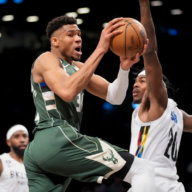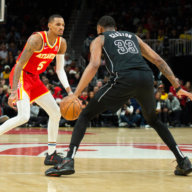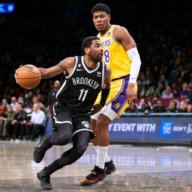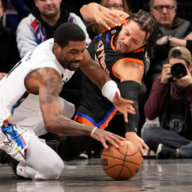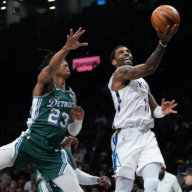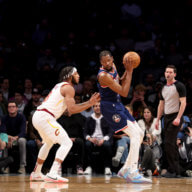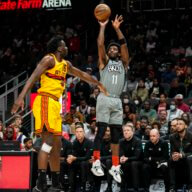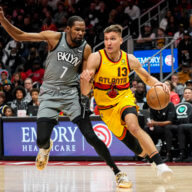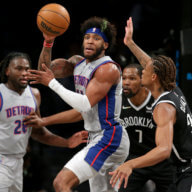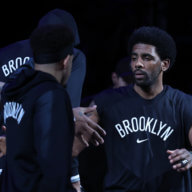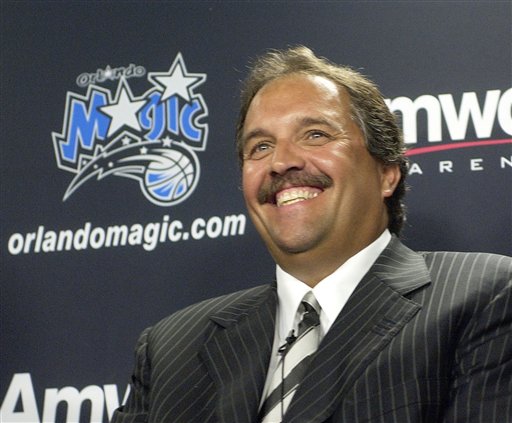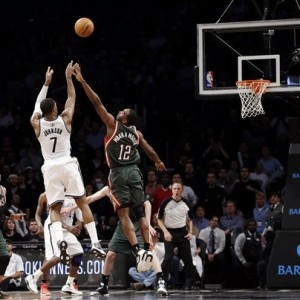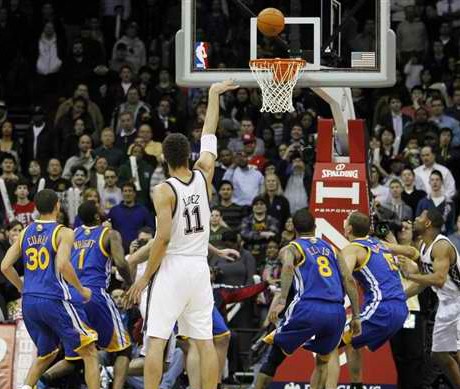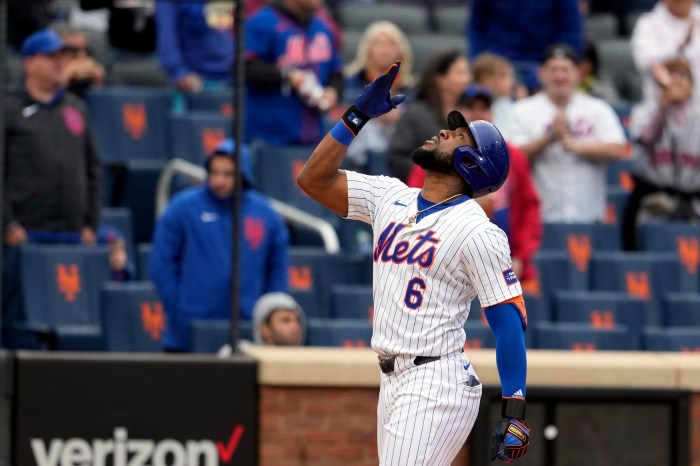 Since NAS had so much fun reviewing John Calipari’s new book a few months ago, we thought we’d continue the trend of reviewing new books about the game as we get to read them. Because remember kids, reading is fundamental, even if it’s not always Nets-centric.
Since NAS had so much fun reviewing John Calipari’s new book a few months ago, we thought we’d continue the trend of reviewing new books about the game as we get to read them. Because remember kids, reading is fundamental, even if it’s not always Nets-centric.
Bill Simmons, aka, ESPN’s “The Sports Guy,” has long been one of my favorite writers – with his fan’s perspective and irreverent sense of humor that often incorporates pop culture references galore, I love it – but he’s definitely an acquired taste for those who are looking for more serious, “insightful” opinions in sportswriting.
So I’m fairly certain that Simmons’ new book “The Book of Basketball,” is going to invite a whole range of opinions. There will be many who call the book overlong and self-indulgent, with way too much focus on the Boston Celtics, and an blatant disregard for some of the newer statistical metrics that have been embraced by many of us in the True Hoop Network. Those critics wouldn’t be wrong, but I enjoyed this book anyway, because it reads exactly how I would expect a 715-page magnum opus about basketball written by Bill Simmons to read.
It’s uneven and rambles a bit, and can’t say I learned a whole lot about the game, except the fact that Michael Jordan is a deadly, cold-blooded assassin (duh), and that Bill Russell was clearly better than Wilt Chamberlin (I’m too young to have seen either of them play, so it’s an argument I could care less about). But again, I don’t think you ever read Simmons to learn anything new. A Simmons column is the equivalent of going to a bar with a bunch of sports-obsessed buddies and talking about the game for hours – with the conversation devolving into such things as Rocky movies or OJ Simpson references as more and more drinks are consumed. You read Simmons, because you’re just as much a fan of the game as he is. This is the mentality that got me into sports blogging in the first place. While a game recap in a daily newspaper is usually informative, I’ve always found the best insight comes from fan observations. Fans are the ones who complain about a guy not getting enough playing time, and they’re the ones who remember the otherwise inconsequential games in January where somebody made an incredible shot that makes us revere those players in such a way that it can sometimes defy logic. Sports blogging gives those of us who are lucky enough to have developed a regular audience an opportunity to share our own silly little observations about the game. I can only hope that my observations lead to additional observations and reactions from our readers. Simmons embraces this mentality, and for the most part, so does “The Book of Basketball.”
The Nets actually come up in the book more than I expected – especially the ABA version of the team. Simmons appears to sympathize with how the NBA-ABA merger in the summer of 1976 decimated the Nets (then of New York). The Nets had to pay the Knicks $4.8 million over 10 for territory rights – a move that so financially crippled the organization, they had to unload their franchise player Julius Erving to stay afloat.
In another chapter, Simmons looks at the 2002 MVP race between Tim Duncan (who ultimately won) and then-Net Jason Kidd. Categorizing the MVP as “fishy but ultimately okay,” Simmons sets up the argument where he sees the logic of a Kidd MVP: “Energized by the change of scenery, Kidd led the perennially crappy Nets to 52 wins, swung the New York media behind him and stood out mostly for his unselfishness and singular talent for running fast breaks …”
Of course, Simmons swings the argument back to Duncan and argues “why was this close? … That a 39 percent shooter for a 52-win team in a brutal conference nearly stole the MVP from the greatest power forward ever during his finest statical season for a58-win team …”
So yes, Simmons essentially mocks one of my biggest hang-ups as a Nets fan in why Kidd didn’t win the MVP in 2002, but at least the Sports Guy is consistent. Later in the chapter, he dismisses the back-to-back MVPs won by Steve Nash in Phoenix for much of the same reasons why he thought Kidd shouldn’t have won a few years early. That’s all you can ask for in a sports fan – some consistency, even if you don’t agree with what they’re being consistent about.
While these little arguments are fun to read about, the meat and potatoes of Simmons’ book is his Hall of Fame “Pyramid,” which is largely based on something he outlines in the book’s opening chapter after a tense encounter with Isiah Thomas. During this conversation, Thomas, who Simmons has ripped countless times in his columns, and the Sports Guy talk about the “secret” to basketball, something Thomas’ “Bad Boy” Pistons teams embodied – that it wasn’t always about statistics and all-star performances, but rather a team coming together as cohesive, selfless unit. Simmons’ pyramid endorses players who’ve accepted “the secret,” explaining how a no-score all-defense player like Dennis Rodman could be ranked 69th (ha) in the pyramid, ahead of bigger all-around stars like Chris Webber, Shawn Kemp, Tracy McGrady and Vince Carter. This fascination with “the secret,” also leads to some real head-scratching choices for the pyramid, like Robert Horry (“Big Shot Bob” aside, it’s hard to look at the back of his basketball card and say he’s one of the top 100 players in NBA history) and Arvydas Sabonis (really can’t explain this one, and Simmons’ himself doesn’t do a great job except to say he could have been great if his knees didn’t go on him. But the same could be said about Ed O’Bannon).
During the vast pyramid section, Simmons loses me when he discusses players I never saw play in-person and players he obviously never saw in person. While he cites an extensive number of books and magazines for his research, it’s hard to read opinions by a sports fan when that person really doesn’t have much of a connection to player. I’m one of the biggest Mets fans out there, but I don’t think I would ever be comfortable writing a few thousand words about why Tom Seaver is the greatest Met of all time because I never really saw him play. I wish Simmons had the same kind of restraint.
Still, trying to follow Simmons’ logic for the opinions is an entertaining ride, despite the fairly predictable ending (a top of five of Bird, Magic, Kareem Abdul-Jabbar, Russell and Jordan). Yes, the constant Celtics references could be a bit grating for the anti-Boston fans out there, but it’s understandable in a way that I would expect to read a similar book on baseball to talk about the Yankees non-stop. It’s best not to be daunted by the length of the book – it’s written in such a way that one could put it down for a while and come back without missing a beat. And there probably won’t be another mass marketed sports book that takes so many humorous pot shots at Karl Malone and Kobe Bryant, so at the very least, there’s plenty of entertainment value to be had in that.

